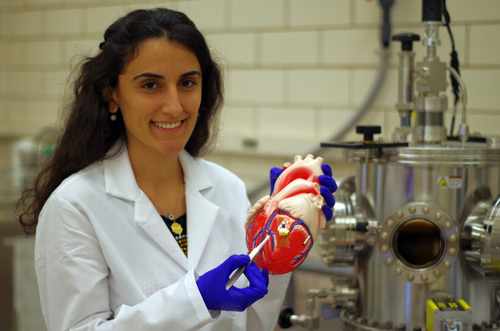Canan Dagdeviren, a TASSA Awardee, is elected as a 'Junior Fellow' to Society of Fellow at Harvard University
By Bahri Karaçay
Dagdeviren never met her paternal grand father. He was only 28 years old when his heart failed and stopped beating. This tragic event determined her future career. At an early age, Dagdeviren promised herself that by the age that her grandpa passed away, she would do something that would help heart disease patients so that their lives would not be ended prematurely like her grandfather. And she kept that promise. When she received her Ph.D. from the University of Illinois, at Urbana-Champaign, she held a device in her hand that she developed and proved in preclinical studies to power heart-devices by converting mechanical energy of heartbeats into electrical energy.
Her research and inventions gained her an instant recognition in scientific community with sixteen awards, including one given by TASSA in 2014. But probably the most prestigious award she received so far was her election to the Society of Fellows at Harvard University. Canan Dagdeviren became the first scientist from Turkey to be selected as a Junior fellow in the history of Harvard Society of Fellows. "It means a lot, it is a victory and accumulation of effort and love of 29 years" she says. " It is beyond my personal success, I do represent my beautiful home country, Turkey, as I’m the first scientist from Turkey to be selected to the society".
Currently a postdoctoral research associate in Koch Institute for Integrative Cancer Research, MIT, Dagdeviren received many congratulation letters from Turkey. Those that were particularly meaningful for her were the ones coming from Turkish women. "I’m happy to be a ‘role model’ for young generation, especially for underestimated women of my country", said Dagdeviren.
Dagdeviren's research has wide-spread implications, including variety of sensors and energy harvesting components for cardiac pacemakers, cardiac vessel stents, non-invasive, wearable blood pressure sensors, and skin cancer detection bio-patches. She designed and fabricated a device that is flexible and is also capable of converting mechanical energy from internal organ movements into electric energy when attached to the surface of the organs to power medical devices. Her research provides evidence that these devices can yield significant amounts of electrical power from motions of internal organs, up to and exceeding levels relevant for practical use in implants. Thus, the technology may either extend the battery life of an implanted medical device or totally eliminate the need for battery, saving patients from repeated and complicated surgeries.
Dagdeviren is currently working on developing a device that will allow local and on-demand drug delivery to the brain in addition to electrical stimulation. "My new device represents a fundamental shift in the traditional neuromodulation delivery, which requires lengthy time spans and stimulates the entire brain unnecessarily" she says. "Instead, I will create a probe capable of dynamically adjusting the therapy within seconds and with pinpoint accuracy which will have important impact on individuals who suffer from devastating Parkinson’s disease, anxiety or depression."
Amid ongoing invention and research efforts, Dagdeviren also manages to work with young inventors in the Society of Women Engineers, and mentors undergraduate students from the US and Turkey via her communications on skype. One of her dreams is to develop a fellowship program with her late granddad's name to inspire and support future scientists from Turkey.
